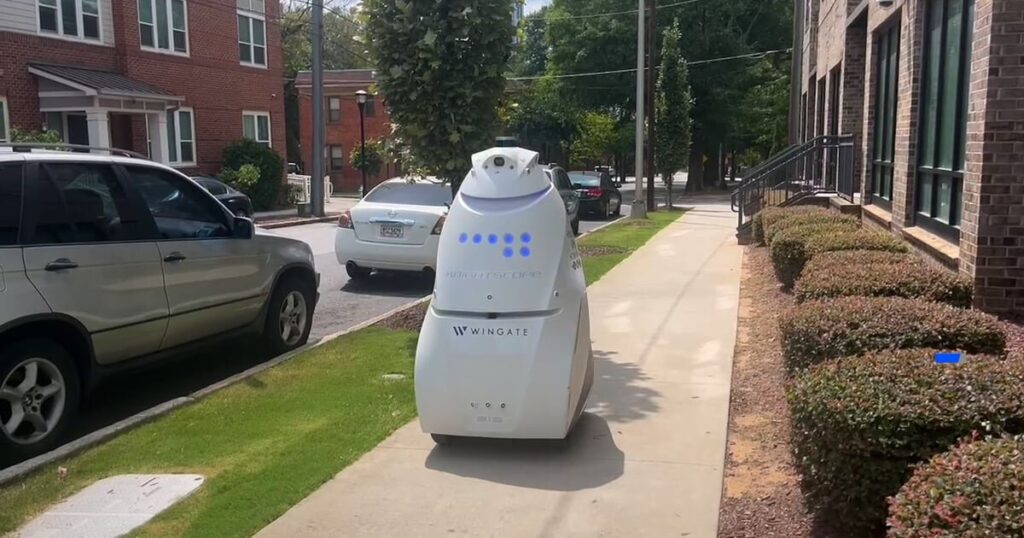In a testament to the evolving landscape of urban security, an Atlanta neighborhood has turned to cutting-edge technology, introducing a security robot to patrol its streets. These autonomous machines, which have already made their mark in malls, hospitals, airports, and casinos across the country, come equipped with a suite of advanced features including 360-degree high-definition cameras, microphones, and thermal sensors.
The capabilities of these robots extend far beyond simple surveillance. Knightscope’s K5 robot, for example, can identify license plates and recognize faces, employing wireless signal detection to spot mobile devices. Stacy Stephens, Knightscope’s executive vice president and chief client officer, explains that thermal sensors are crucial, as they can detect unusual swings in air temperature that may indicate a fire or the presence of people in unauthorized areas.
The efficacy of these robotic sentinels is backed by real-world examples. A notable case is a Las Vegas apartment complex, once notorious for its high frequency of 911 calls, which implemented the K5 in 2020. Both the apartment managers and the local police observed a marked decrease in crime rates within just a few months, according to the Las Vegas Review-Journal.
In Atlanta, the initiative is already taking shape. Apart from the newly deployed City Lights robot, Mercedes-Benz Stadium utilizes a robotic dog named Benzie to patrol the premises at night. These robots are part of a growing trend of high-tech security measures being deployed across the city. At City Lights, a senior living community on the 400 block of Boulevard, the residents are slowly acclimatizing to their robotic guardian.
“The robots will also have the ability to … respond in an automated fashion,” said City Lights spokeswoman Sage Hoare. Residents have mixed feelings about the newcomer, with some expressing optimism. Henry Evan, a resident, remarked on the robot’s constant presence, while Arturo Lamotta noted the potential for increased security despite not having personally experienced crime in the area.
Data from the Atlanta Police Department, as analyzed by The Atlanta Journal-Constitution, reveals that the Old Fourth Ward neighborhood, including the stretch of Boulevard where City Lights is located, experiences an average of 19 firearm-related crimes each year, such as aggravated assaults and robberies, between 2021 and 2023.
Stacy Stephens, with a law enforcement career spanning over 25 years before co-founding Knightscope, believes that these robots serve as a significant deterrent. “That [robot] is going to get the attention of somebody who’s out to do some harm, and they’re going to begin to second-guess whatever their activities are,” she said.
However, not everyone is entirely convinced of the benefits. Jay Stanley, a senior policy analyst for the ACLU, acknowledges that while the robot is a powerful deterrent against criminal activity, it also monitors everyday citizens, which could lead to unease about pervasive surveillance. “I don’t know that Americans want to live in a world where there’s one of these on every block, but if there were, they could trace everywhere you are all the time,” Stanley cautioned.
Despite the promise of these security robots, human guards continue to patrol the neighborhood, particularly during the early morning and late evening hours. The robots are designed to complement, rather than replace, human efforts. “You want the robots to do the boring, routine, monotonous … work. You want the humans to do the strategic, hands-on, empathetic or sympathetic-type work,” Stephens added.
As Atlanta embraces this high-tech approach to safety, it remains to be seen how the integration of robotic security will shape the future of urban living.


